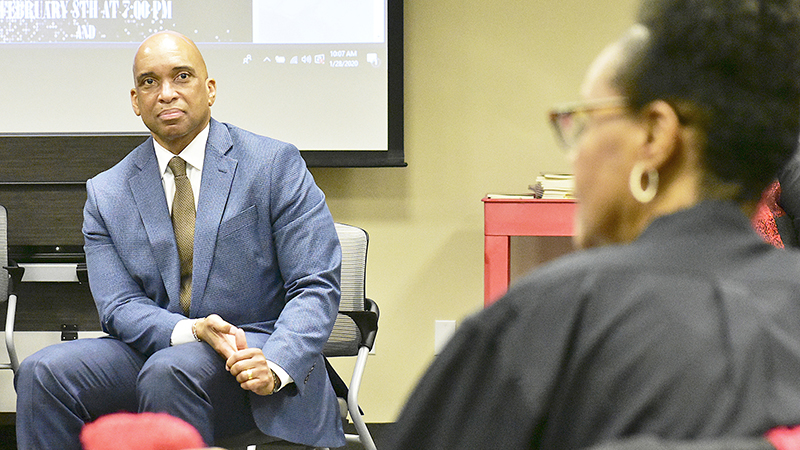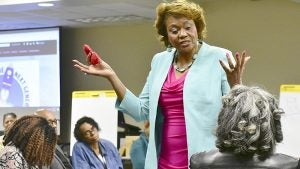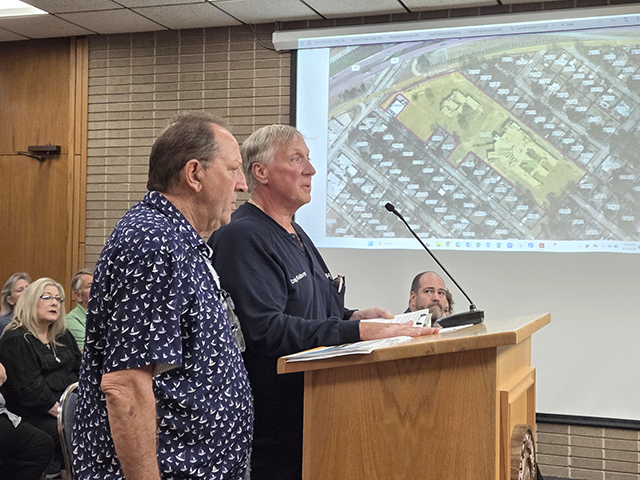PAISD teachers learning restorative discipline practices to better campus climate
Published 12:15 am Thursday, January 30, 2020

- Port Arthur ISD Superintendent Dr. Mark Porterie listens to comments from Memorial High School counselor Lady Savoie-Watson during restorative discipline practices (RDP) training in January at the Port Arthur ISD administration building. (I.C. Murrell/The News) 1-28-20
Port Arthur Independent School District employees are learning that getting to know each student is an important part of the discipline process.
The district this week is hosting training on restorative discipline practices, or RDP, at its administration building. The TEA cites a definition of RDP from a University of Texas at Austin professor as a “relational approach to building school climate and addressing behavior.”
Connection with each student is a tool Dr. Gaye Lang, TEA statewide RDP director, emphasizes in building relationships. Lang is leading the training.
“The benefit is, if I’m in a relationship with [a student], and I know [that student] has a dog or a cat and I have one, I might say, ‘Hey, how’s your dog doing? Is he OK?’ He might say, ‘Yeah,’” Lang said. “Then I might say, ‘OK, well mine got sick last week.’ We might have something to talk about that’s meaningful, respectful and positive. Because the next time [the student] does something wrong, I’m going to say, ‘Now, I know you know better than that. I thought we had a deal you were going to work in my class.’ If your dog were sitting here, he would be proud of you, wouldn’t he? He’d say, ‘Oh, my goodness, my master’s not doing good.’ You want your dog to be proud of you, too.
“… You can’t teach somebody you don’t have a relationship with,” she said.
The PAISD is using a portion of a $600,000 grant from the agency to host the training, which Superintendent Dr. Mark Porterie said was scheduled well before reports of the district’s out-of-school suspension rate were published.
The district issued 32.45 suspensions per 100 students during the 2018-19 school year, according to TEA data.
“It’s crucial for any classroom in our district, and it’s crucial for our community because, obviously, the things that are happening now are coming from a lack of respect,” Porterie said. “The killings, the robberies, all of those things that are happening in the community are coming from a lack of respect. But, what we’re doing is trying to implement that in our schools, and we want it to flow into the homes and into the community.”
During Tuesday’s session, Lang stressed that values are the building blocks of an interpersonal circle that each teacher can form among students in the classroom, but added the values must be taught before a circle is formed.
“Teaching our kids values is a big takeaway for me, because somehow that has gotten lost,” said Noelle Green-Anderson, an assistant principal at Thomas Jefferson Middle School. “Being able to use those words consistently and being able to reinforce those values consistently will help with discipline as well.”
The TEA began training on RDP in a partnership with the Institute for Restorative Justice and Restorative Dialogue at the UT Austin’s School of Social Work in the fall of 2015.

Dr. Gaye Lang, Texas Education Agency statewide director for restorative discipline practices (RDP), conducts training Tuesday at the PAISD administration building.
Success model
“We had a school in San Antonio that was doing this already,” Lang said. “When they got UT to come in and codify the process, meaning look at what they’re doing and document the process to see if it really works, and they found out that it worked, then TEA looked at that.”
Lang then traveled across the country for more research on RDP and saw schools in Oakland, Calif., experienced “tremendous results” from the practices.
“Our children are not that much different from anybody else’s,” she said. “If they got it, certainly we can. That’s how we pushed it forward.”
Lang then created training as a way to sustain the progress.
“I think a lot of these techniques we are learning today will help accomplish what we need to at school, because it encourages us to get to know the students better to build better relationships with them to be able to discipline them,” Green-Anderson said.
Porterie believes a lack of values in the community has led to violent crimes in recent years. He advocates for parental involvement to help children meet behavioral expectations and said he will introduce a parental component to RDP training at a later date.
“We have to do something for our entire community,” Porterie said. “Yes, we want the schools to be productive and successful, but we want the entire Port Arthur community to understand what respect is and understand values.”
That would mean getting all 1,300 employees in the district involved, Porterie believes.
“We need to relate differently to one another because we’re modeling for our kids every day,” he said. “I’m talking about not only teachers, [but] custodians, cafeteria workers, transportation, maintenance … all of us need to understand that we respect one another as adults and show children how to do that. We’re all in this together. Thirteen hundred employees and we can make that happen. With the high number of employees we have, if we model that correctly, we can change the entire community.”







